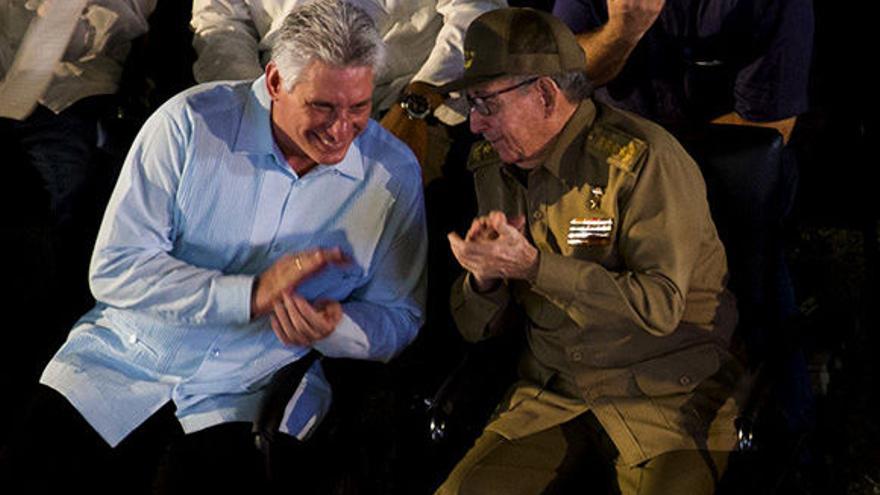
![]() 14ymedio, Havana, July 26, 2018 — Raul Castro returned to the limelight, making an appearance at the main event celebrating the sixty-fifth anniversary of the assault on the Moncada Barracks, considered by the government to be the start of the Cuban revolution. In his first speech since giving up power on April 19, the former president spoke once again the nation’s tense economic situation, called for maximum savings and described recent electoral defeats of leftist Latin American leaders as a “neoliberal offensive.”
14ymedio, Havana, July 26, 2018 — Raul Castro returned to the limelight, making an appearance at the main event celebrating the sixty-fifth anniversary of the assault on the Moncada Barracks, considered by the government to be the start of the Cuban revolution. In his first speech since giving up power on April 19, the former president spoke once again the nation’s tense economic situation, called for maximum savings and described recent electoral defeats of leftist Latin American leaders as a “neoliberal offensive.”
Castro, who remains secrectary general of the Cuban Communist Party, referred to the current constitutional reform process, stating its success “wil depend on Cubans’ active and committed participation.” He urged that all necessary steps be taken to ensure that “every citizen understands how profound and sweeping the proposed changes in the text are.”
At the beginning of this month five Protestant denominations made public statements opposing marriage equality, which the proposed constitution defines as the “union between two people” rather than “between a man and a woman.” For this reason several religious communities are calling on their members to reject the constitution.
Some opposition groups are also calling for a “no” vote in the referendum in protest against an article in the document which identifies the Communist Party as of the nation’s guiding force and reaffirms the “irrevocability” of the socialist system. Numerous dissident organizations have begun to campaigning for a negative vote.
“We cannot ignore the complicated nature of the current internal and external situation,” Castro acknowledged during the commemoration of the 1953 assault on the Moncada Barracks — at the time the most important military fortress in eastern Cuba — in which he took part with his brother.
The political event was broadcast live by state radio and television and was attended by more than 10,000 Santiago residents, who began arriving at the site sometime after midnight on Wednesday.
Castro warned of “an ongoing, tense situation in foreign earnings as a result of anticipated economic impacts from sugar exports and tourism” and blamed the problems “a prolonged drought, a devastating Hurricane Irma, unseasonably heavy rains and tropical storm Alberto.”
The former leader also cited the U.S. embargo, a standard talking point in his speeches, and denounced its “tightening” in recent months, which coincided with the arrival of Donald Trump in the White House.
“Despite these adverse factors, as previously reported, there was a slight growth of the economy in the first half of the year,” he said, referring to the 1.1% of GDP growth between January and June 2018, an insufficient figure for a real improvement in the lives of Cubans, according to some economists interviewed by this newspaper.
Castro described this result as “encouraging” but said that “it is necessary to ensure exports and reduce all non-essential expenses to allocate the amounts available to production and services that generate income in foreign currency.” The phrase was received with very serious faces among those present.
The memory of the economic crisis of the 90s, officially named the Special Period, has resurged with more intensity in the last year with the cuts of oil shipments to the island from Venezuela, the worsening of the shortages of products in the network of retail stores and the return of power cuts in several cities in the country.
The former president defined savings as “the main source of resources” in these circumstances and, as is traditional in these speeches whose style was coined by his brother Fidel Castro, he did not detail the figures for productive achievements or future projects.
In relation to the retreat suffered by the left in Latin America, the former president blamed Washington and its “methods of unconventional warfare,” in addition to describing as “fraudulent” some successes of the right in Latin American elections for having benefited from “support of the hegemonic media.” It is, according to him, “a neoliberal offensive.”
Castro did not miss the opportunity to reiterate Cuba’s “unwavering solidarity” with Nicolás Maduro and Daniel Ortega, in addition to demanding the freedom of former Brazilian president Luiz Inácio Lula da Silva and “his right to be the presidential candidate of the Workers Party” in the upcoming Brazilian elections.
Relations with Washington occupied a good part of the speech in which Castro reiterated the phrase that “Cuba should not be expected to renounce the ideas for which it had fought for more than a century in order to improve relations with the United States.”
This week the Assistant Secretary of State for Latin America, Paco Palmieri, met in Havana with officials of the Foreign Ministry, who once again denied the attacks and accused the United States of seeking political ends. In his speech this Thursday, Raul Castro defined the alleged attacks as a pretext for the Trump Administration to cool relations with the island.
When he finished speaking, the first rays of sun had not yet come out in Santiago de Cuba.
_____________________________
The 14ymedio team is committed to serious journalism that reflects the reality of deep Cuba. Thank you for joining us on this long road. We invite you to continue supporting us, but this time by becoming a member of 14ymedio. Together we can continue to transform journalism in Cuba.
